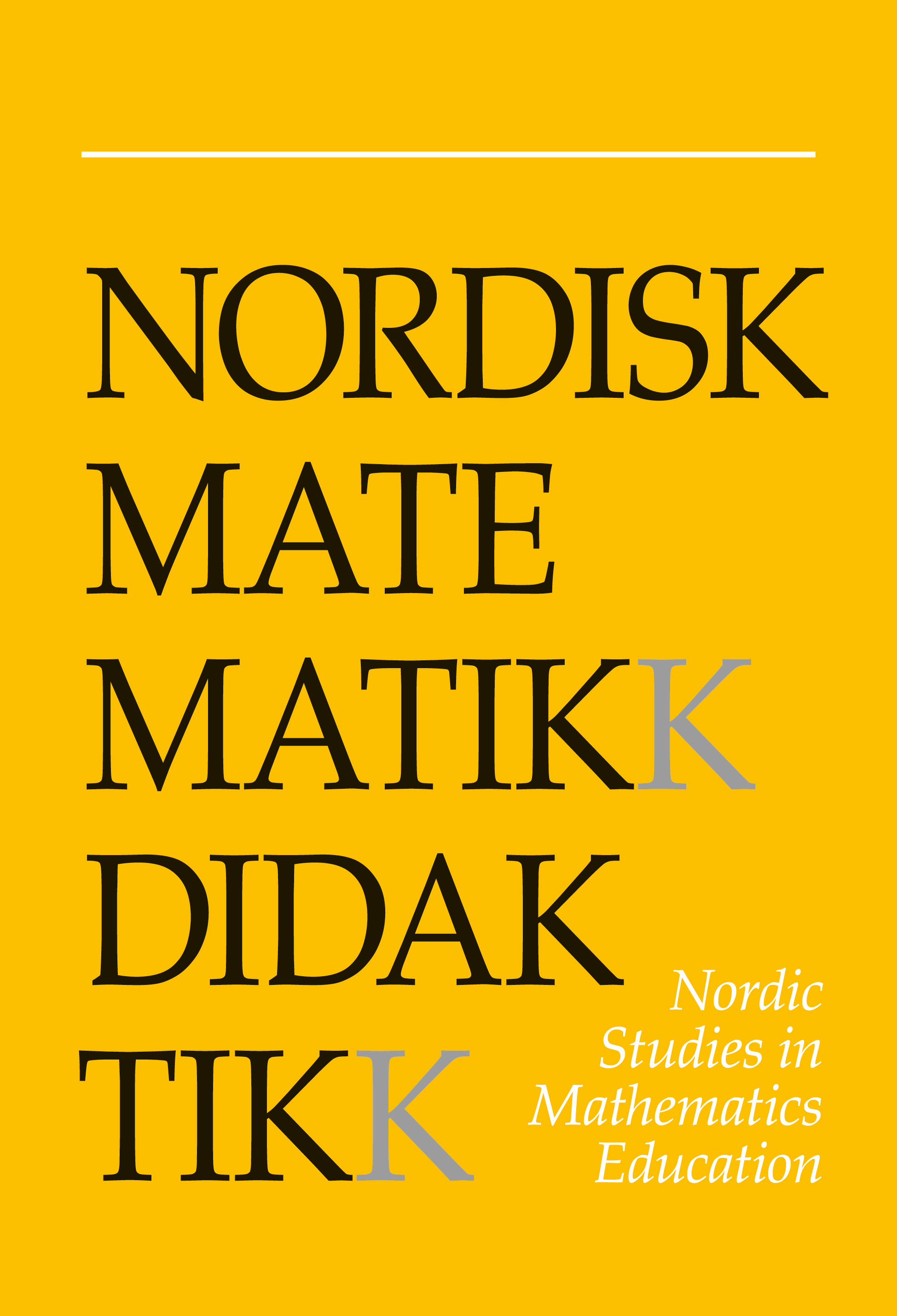Identity development in limbo: teacher transition from education to teaching
DOI:
https://doi.org/10.7146/nomad.v15i4.148288Abstract
The theories and results discussed in this article are from a study investigating the identity development of novice primary mathematics teachers. The article has two aims: first, to elaborate the notion of beliefs in relation to the notions of identity and identity development, with the purpose of developing a framework to investigate the process of becoming and being a teacher of mathematics; and second, to offer an example of the use of this framework in a study of novice primary mathematics teachers. The core of the example is the case of Jenny 1, a Swedish novice primary mathematics teacher. Jenny’s case, however, is not simply about her but also about identity development when the formal aspect of employment is missing, a case not rare 2 in Sweden.
References
Boaler, J. (1999) Participation, knowledge and beliefs: a community perspective on mathematics learning. Educational Studies in Mathematics, 40 (3), 259-281. https://doi.org/10.1023/A:1003880012282
Charmaz, K. (2006). Constructing grounded theory. A practical guide through qualitative analysis. London: Sage Publications.
Cooney, T.J. (2001) Considering the paradoxes, perils, and purposes of conceptualizing teacher development. In F. L. Lin & T. J. Cooney (Eds.), Making sense of mathematics teacher education (pp. 9-31). Dordrecht: Kluwer Academic Publishers. https://doi.org/10.1007/978-94-010-0828-0_1
Ensor, P. (2001). From preservice mathematics teacher education to beginning teaching: a study in recontextualizing. Journal for Research in Mathematics Education, 32 (3), 296-320. https://doi.org/10.2307/749829
Flyvberg, B.(2006). Five misunderstandings about case-study research. Quality Inquiry, 12 (2), 219-245. https://doi.org/10.1177/1077800405284363
Frykholm, J. A. (1999). The impact of reform: challenges for mathematics teacher preparation. Journal of Mathematics Teacher Education, 2 (1), 79-105. https://doi.org/10.1023/A:1009904604728
Gellert, U. (2007). Routines and collective orientations in mathematics teachers' professional development. Educational Studies in Mathematics, 67, 93-110. https://doi.org/10.1007/s10649-007-9089-x
Lave, J. & Wenger, E. (1991). Situated learning. Legitimate peripheral participation. Cambridge: Cambridge University Press. https://doi.org/10.1017/CBO9780511815355
Lerman, S. (2000). The social turn in mathematics education research. In J. Boaler (Ed.), Multiple perspectives on mathematics teaching & learning (pp. 19-39). Westport: Greenwood Publishing Group. https://doi.org/10.5040/9798400688362.0005
Lerman, S. (2001). A review of research perspectives on mathematics teacher education. In F. L. Lin & T. J. Cooney (Eds.), Making sense of mathematics teacher education (pp. 33-52). Dordrecht: Kluwer Academic Publishers. https://doi.org/10.1007/978-94-010-0828-0_2
Lerman, S. (2009) Studying student teachers' voices and their beliefs and attitudes. In R. Even & D. L. Ball (Eds.), The professional education and development of teachers of mathematics (pp. 73-82). New York: Springer. https://doi.org/10.1007/978-0-387-09601-8_8
Matos, J. F. (2009). Mathematics teachers' professional development: process of learning in and from practice. In R. Even & D. L. Ball (Eds.), The professional education and development of teachers of mathematics (pp. 167-184). New York: Springer. https://doi.org/10.1007/978-0-387-09601-8_19
NCTM (2001). Professional standards for teaching mathematics. Reston: National Council of Teachers of Mathematics.
Pajares, F. M. (1992). Teachers' beliefs and educational research: cleaning up a messy construct. Review of Educational Research, 62 (3), 307-332. https://doi.org/10.3102/00346543062003307
Patton, M. Q. (2002). Qualitative research & evaluation methods. London: Sage Publications.
Petersson, B. (2003) Intervjubaserade studier av kollektiva identiteter. In B. Petersson & A. Robertson (Eds.), Identitetsstudier i praktiken (pp. 35-52). Malmö: Liber ekonomi.
Phillip, A. R. (2007). Mathematics teachers beliefs and affect. In F. K. Lester (Ed.), Second handbook of Research on Mathematics Teaching and Learning (pp. 257-318). Reston: National Council of Teachers of Mathematics.
Ragin, C. C. (1992). Introduction: cases of "what is a case". In C. C. Ragin & H. S. Becker (Eds.), What is a case? Exploring the foundations of social inquiry (pp. 1-17). Cambridge: Cambridge University Press.
Sfard, A. & Prusak, A. (2005). Telling identities: in search of an analytic tool for investigating learning as a culturally shaped activity. Educational Researcher, 34 (4), 14-22. https://doi.org/10.3102/0013189X034004014
Sfard, A. (2008). Thinking as communicating. Human development, the growth of discourses, and mathematizing. New York: Cambridge University Press. https://doi.org/10.1017/CBO9780511499944
Schifter, D. (1996). What's happening in math class? Volume 2: reconstructing professional identities. New York: Teachers College Press.
Skott, J. (2001). The emerging practices of a novice teacher. Journal of Mathematics Teacher Education, 4 (1), 3-28. https://doi.org/10.1023/A:1009978831627
Skott, J. (2010). Shifting the direction of belief research: from beliefs to patterns of participation. In M. F. Pinto & T. F. Kawasaki (Eds.), Proceedings of the 34th conference of PME (Vol. 4, pp. 193-200). Belo Horizonte: PME
Sowder, J. T. (2007) The mathematical education and development of teachers. In F. K. Lester (Ed.), Second handbook of Research on Mathematics Teaching and Learning (pp. 157-224). Reston: National Council of Teachers of Mathematics.
Speer, N. M. (2005). Issues of methods and theory in the study of mathematics teachers' professed and attributed beliefs. Educational Studies in Mathematics, 58, 361-391. https://doi.org/10.1007/s10649-005-2745-0
Speer, N.M. (2008). Connecting beliefs and practices: a fine-grained analysis of a college mathematics teacher's collections of beliefs and their relationship to his instructional practices. Cognition and Instruction, 26, 218-267. https://doi.org/10.1080/07370000801980944
Stentoft, D. & Valero, P. (2009). Identities-in-action. Exploring the fragility of discourse and identity in learning mathematics. Nordic Studies in Mathematics Education, 14 (3), 55-77.
Wenger, E. (1998). Communities of practice. learning, meaning, and identity. Cambridge: Cambridge University Press. https://doi.org/10.1017/CBO9780511803932
Wilson, S. & Cooney, T. (2002). Mathematics teacher change and development. The role of beliefs. In G. C. Leder, E. Pehkonen & G. Törner (Eds.), Beliefs: a hidden variable in mathematics education? (pp. 127-148) Dordrecht: Kluwer Academic Publishers. https://doi.org/10.1007/0-306-47958-3_8
Downloads
Published
How to Cite
Issue
Section
License

This work is licensed under a Creative Commons Attribution-NonCommercial-ShareAlike 4.0 International License.



